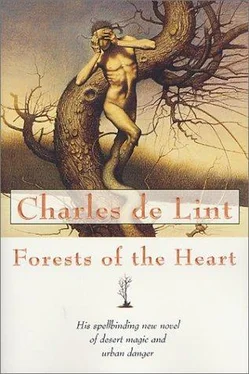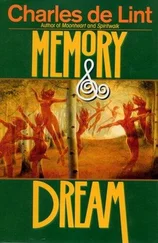Sunday turned from the sink to look at him. The humor that usually sparkled in her eyes had been replaced with an unfamiliar sadness.
“We’ve always been proud of you, Tommy,” she said.
“Yeah, right.”
He’d left home when he was fifteen, full of an anger he couldn’t explain, torn between the traditionalists—best exemplified by his aunts, or by the Warrior’s Society—and those who’d simply given up, the kids sniffing glue and gasoline in back of the community center when they couldn’t score some booze or drugs, killing themselves slowly instead of the way the more desperate did: putting the barrel of a hunting rifle in their mouth, or taking a drop from the garage rafters with a rope around their necks. He’d just needed to get away. Away from the losers. Away from that house of women. Away from the sweat-lodge boys and the Indian Power champions.
So what did he do? He tracked down his father in the city and went to live with him. The first couple of weeks were great. Frank Raven welcomed his son into the seedy apartment he had in Lower Foxville, proudly introducing him to everyone as the long-lost son “the bitch” had stolen from him. But blood was true and a father’s love always won out in the end, because here was his boy again, making a man’s choice, the right choice, living with his father, where he belonged. There was a party every other night and no one said he was too young to join in. It was, “Welcome to civilization,” and “Here, Tommy, have a brew,” and “Fuck the elders; we’ll make our own good times.”
Then one night, without provocation, Frank beat the crap out of him in the middle of one of those parties and threw Tommy out on the street to fend for himself.
“You ever come back here again,” Frank told his son, “and you’re dead meat. Got it?”
Tommy lived on the streets then, too proud to go back to the rez with his tail between his legs, too scared to approach his father again. Frank’s friends, when they saw Tommy, took to calling him Dead Meat after his father’s parting words.
Life hadn’t been easy after that. He turned to sleeping on the streets, panhandling, or turning tricks down at the Y. Some of the guys hanging in the changing rooms got real turned on by an Indian kid. They’d call him Chief, or Squaw Boy, slip him an extra few bucks if he’d use B-movie Indian dialogue. A year later he was in juvie hall where Angel bailed him out.
Angel. Her real name was Angelina Marceau and she looked like an angel—long dark hair falling in a waterfall of natural ringlets, heart-shaped race, the warmest eyes you could imagine. All she was missing were the wings. They called her the Grasso Street Angel, not because of her looks, but because of the way she helped people, especially kids and the homeless, out of a street-front office on Grasso Street. Like most of the men who knew Angel, Tommy was half in love with her from the first time they met. She’d organized an all-ages teen dance at the Crowsea Community Center which Tommy and a few of his street pals crashed, six of them, high as kites and drunk, floundering about on the dance floor, pushing kids around and having themselves a grand old time until suddenly Angel was standing there, staring them down. She didn’t have to do anything. Just the look in her eyes shamed them into leaving.
But Tommy came back and helped clean up after the dance. He wouldn’t talk to anyone—especially not Angel—but he wanted to be near her. There was something in her presence that soothed the constant anger that sometimes the drugs and alcohol dulled, sometimes they fed. To this day, he couldn’t explain what it was. In those days he didn’t even try.
He didn’t turn over a new leaf after that night. A month later a brawl landed him in juvie where Angel bailed him out. She wasn’t there to help him, but when she saw him slouched on a bench, she came over and sat down beside him.
“I remember you,” she said. “You were at the dance last month.”
Tommy stared at the floor, unwilling, unable to look at her.
“What are you in for?” she asked.
He shrugged. “Fighting.”
“Did you start it?”
Tommy hesitated, then finally looked up at her, saw himself reflected in those warm, kind eyes of hers. He nodded.
She smiled. “Well, at least you’re honest. You think it’ll happen again?”
“Probably.” That wasn’t what he’d meant to say, but he couldn’t seem to lie to her. “But I’ll try not to.”
She didn’t say anything for a long moment, just studied him. It was weird, the way she looked at him. It wasn’t judgmental, but it was definitely taking his measure. She made him think of his mother, he realized. His mother and the Aunts. They had that same way of looking at you that made you stop and think about what exactly it was you were trying to prove.
“I... I just get angry,” he found himself saying. “I guess I’m always angry.”
“What about?”
“Don’t know.”
She nodded. “Let me talk to the sergeant,” she said. “I’ll see if I can get the charges dropped.”
Tommy had tried to do good after that. Angel got him into AA, found him a room in a boardinghouse, a job bagging groceries at a store on Grasso Street, just a couple of blocks away from her street-front office. He’d come into her office from time to time and help out, sweeping the floor, cleaning the windows. Mostly he’d listen to her talk, his own tongue stuck fast to the roof of his mouth so that he could only reply in monosyllables. Things were going well, but after a while he drifted back into the street life, why, he didn’t know. But he started calling in sick at work, stopped going to AA meetings. He’d hang with the guys, drinking, fighting, boosting car stereos and the like. He didn’t see Angel again for about a year, not until he was picked up and dumped off in a holding cell at the Crowsea Precinct.
He was lucky. The only charges they had against him were vagrancy, and being drunk and disorderly in a public place. He didn’t know how she found out but when he looked up from the bunk in his cell the next morning, she was standing there on the other side of the bars.
“Hello, Tommy,” she said. “How’re you doing?”
He thought he’d die of shame. There was no recrimination in her voice, or in her eyes, no sense that she was disappointed in him. But seeing her there made him disappointed in himself.
“Not so good,” he told her.
She stood up for him again. It was back to AA, another boardinghouse, another job—this time on the janitorial staff at a high school, cleaning up at nights when the place was empty. It was good to have something to do at night—it kept him from seeing the guys, falling back on his old ways. He could sleep through the day, work at night. Sometimes, when he finished up early, he’d go to the school library and read for a couple of hours.
The routine held until the day he found out that his father had died—drunk as usual. Frank had managed to choke to death on his own puke. One more loser brave, dead in an alleyway. Tommy didn’t even think about what he was doing. He just walked into a bar and had himself a celebratory drink. Then he had some more. When the barman stopped serving him, he went to a liquor store and bought three mickeys of cheap whiskey.
When he came to a day-and-a-half later, he was lying in a nest of trash at the back of some alley. For all he knew it was the same one in which his father had died. He lay there for a long time, then finally stumbled to his feet. Hung over, sick to his stomach, reeling. He knew what he should do. Call his sponsor. Head for the nearest AA meeting. But what was the point? Like father, like son. It was in the genes, ran in the blood, and it was never going to go away. But at least when you were drunk, you couldn’t think. Everything bad just blurred, was bearable.
Читать дальше












